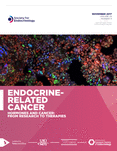Epigenetic modification and cancer: mark or stamp?
- Program in Cancer Genetics, Departments of Oncology and Human Genetics, 546 Pine Avenue West, McGill University, Montreal, Quebec, Canada H2W 1S6
- (Correspondence should be addressed to W D Foulkes; Email: william.foulkes{at}mcgill.ca)
Abstract
Hypotheses are built upon data, but data require hypotheses before they can be understood. The development of the ‘two-hit’ hypothesis of carcinogenesis was a key event in cancer genetics because it provided a testable model of how tumours develop. In this commentary on ‘Promoter hypermethylation patterns in Fallopian tube epithelium of BRCA1 and BRCA2 germline mutation carriers’ by Bijron et al. published in the February 2012 issue of Endocrine-Related Cancer, the need for new grammar and some new hypotheses in epigenetics is discussed. Meanwhile, data suggesting an important role of epigenetic modification in the cause, progression and treatment of cancer continues to accumulate.
- Revision received 13 January 2012
- Accepted 30 January 2012
- Made available online as an Accepted Preprint 30 January 2012
- © 2012 Society for Endocrinology












